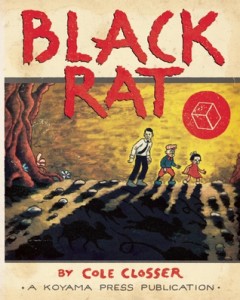Local Artist Shares His Experience With Graphic Narratives
BY: Lauren Johns
Staff Writer
Cole Closser, who teaches design courses at Missouri State University, is a graphic artist who dares to tackle sensitive subjects in his publications.
subjects in his publications.
Closser participated in Meramec’s Writing Festival April 10-11. During his panel, he read through several of his best works, some of which have been included in popular strips like “Regular Show” and “Adventure Time.” Toward the end of the session, the discussion took a darker turn, veering away from cartoons to focus on topics like suicide prevention and his mother’s dementia, which inspired a few of his later works.
As a young child, Closser was exposed to various stories and magazine articles most children his age couldn’t comprehend. His dad was a literature professor, so bookshelves in his childhood home spanned from wall to wall. By age nine he’d read “Of Mice and Men.” At age 10 he wrote a five-page book report on the autobiography of Frederick Douglass. Eventually he came across the magazine “RAW”, a collection of “alternative” or dark comics created by couple Art Spiegelman and Françoise Mouly. The first comic he read was “Maus”, a strip about Spiegelman’s dad surviving the Holocaust.
“Looking back, I probably shouldn’t have been reading those things,” said Closser. “I would always look at it with a flashlight under my covers. Terrifying stuff.”
His early start in literature served him well, as he was nominated for the Will Eisner Comic Industry Award (like the Oscars for comics) for best publication design at San Diego Comic Con in 2014. He was also listed as a notable in “Best American Comics” in 2015.
Closser originally drew a lot of inspiration from vintage comics like Harold Grey’s “Little Orphan Annie” and Roy Crane’s “Captain Easy and Wash Tubbs.” For a time, Closser would print these kinds of comics every day of the week, until his hand started to hurt from all the drawing. Some of his major works include “Little Tommy Lost Book 1” and “Black Rat.”
“My publisher wanted a second “Tommy” book and I told her I only had a third of it done,” said Closser. “A few months later, she called me up again and asked for it. I was only a third of the way done.”
It was during this period of procrastination that he came up with the concept for “Black Rat.”
“I poured my brains and soul into something for the first time,” said Closser. “I wrote the pages quickly, the days a blur.”
One of the stories of “Black Rat” features a childhood memory, a little girl and a rat solving crimes together, all the while surrounded by a symphony of chirping cicadas, the soundtrack to summer in the urban streets; a consistent reminder of home.
“My rat comic got a lot of attention for all the easter eggs,” said Closser. “But people usually add more meaning into things for you. So when they ask if I meant to do something, I’ll sort of fake it and say, ‘what do you think?’ Unless it’s offensive.”
According to Closser, comics aren’t black and white and they’re not all about superheroes. Many people scoff at comics for being too childish and making people illiterate. One particular critic, psychologist Dr. Frederick Wartham, claimed that people who read comics would exhibit more violent traits, such as setting their cats on fire and carrying switchblades.
“A comic is a medium and it’s wrong to dismiss this medium due to a lack of understanding. We don’t dismiss books because of “Twilight.” We don’t dismiss movies because of “Twilight,” said Closser.
Aside from comic books, Closser dabbled in sonnets for a while. During the panel, he discussed one of his first sonnets, which involved a mouse wanting to die and asking an owl to help him go without leaving a trace. At the end, the mouse started to realize all that he would leave behind and changed his mind.
In the sonnet, the moon responded, “If you go your dreams will be deferred, plans denied. Eat, drink, dance, sing. Some days light and some days gloom. Don’t climb the tree unless you’re willing to leave.”
When Closser was speaking for a convention on the subject, several students came up to him and asked his own reason for staying alive. The first thing that came to his mind? Ice cream.











